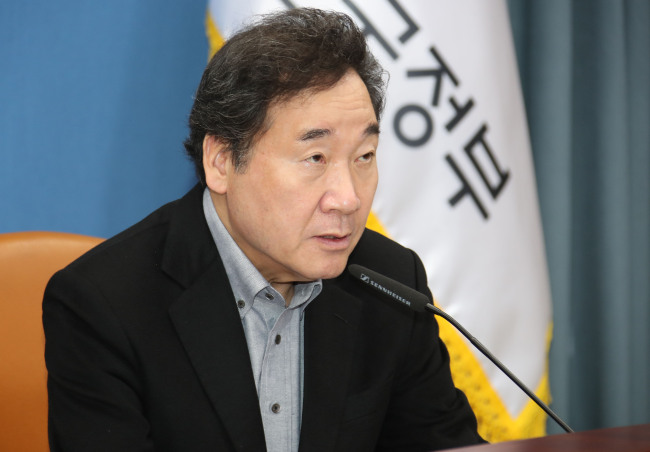Government vows to tackle fine dust, scraps incentives for diesel vehicles
By Jo He-rimPublished : Nov. 8, 2018 - 10:39
Measures to tackle fine dust will be reinforced and support programs for diesel vehicles abolished, the government announced Thursday, as part of plans to combat particulate matter pollution.
The Environment Ministry scrapped the “clean diesel policy” and announced other measures to curb fine dust at the government policy coordination meeting presided over by Prime Minister Lee Nak-yon.
The Environment Ministry scrapped the “clean diesel policy” and announced other measures to curb fine dust at the government policy coordination meeting presided over by Prime Minister Lee Nak-yon.

Pointing to diesel vehicles as among the factors aggravating the fine dust problem, the government said it will abolish the clean diesel policy introduced by former President Lee Myung-bak to encourage the use of diesel cars.
With Thursday’s decision, all incentives such as fee reductions in parking lots and tolls allotted to some 950,000 diesel vehicles in the country will be scrapped. The “low-emission” qualification system that designated diesel cars as eco-friendly will also be discarded.
The government vowed to purchase only eco-friendly vehicles for public transportation and to replace all public transportation vehicles running on diesel by 2030.
The government also plans to expand the emergency pollution measures carried out by ministries and regional governments, a day after the concentration level of particulate matter 2.5 micrometers in diameter exceeds 50 micrograms per cubic meter, to apply to everyone.
As part of the measures, aged diesel vehicles are banned from roads, while operating hours of air pollutant discharge facilities and construction sites are to be shortened. To reduce the number of cars on roads, vehicles with license plates that end with an odd number are allowed to be on roads on odd-numbered dates, and even-numbered cars on even-numbered dates.
These policies had only been mandated for public institutions and civil servants, but the government has decided to apply them to everyone from Feb. 15.
For those that give up aged diesel trucks and buy 1-ton trucks that run on liquefied petroleum gas, the government said it will provide up to 1.65 million won ($1,480) for scrapping and an additional 4 million won for the purchase.
Midsized and large trucks with high emissions rates will be subsidized with 4.4 million won to 7.7 million won when they are scrapped.
To reduce fine dust emissions from coal power plants, the government will also fine-tune its policy to efficiently operate and shut down power plants from March to June, when ultrafine dust levels spike.
Measures will also be reinforced to reduce dust emissions from ships and harbors, promoting the use of propeller ships that run on liquefied natural gas. For urban areas, the government said it will provide subsidies to expand the use of boilers that emit less dust for homes.
The meeting came a day after the worst level of fine dust of the season blanketed South Korea, forcing the government to take emergency measures to curb air pollution.
Regarding the rise of ultrafine dust from Nov. 3 through Tuesday, the Environment Ministry concluded it was caused mostly by domestic factors, including emissions from cars and power plants.
By Jo He-rim (herim@heraldcorp.com)







![[Graphic News] More Koreans say they plan long-distance trips this year](http://res.heraldm.com/phpwas/restmb_idxmake.php?idx=644&simg=/content/image/2024/04/17/20240417050828_0.gif&u=)
![[KH Explains] Hyundai's full hybrid edge to pay off amid slow transition to pure EVs](http://res.heraldm.com/phpwas/restmb_idxmake.php?idx=644&simg=/content/image/2024/04/18/20240418050645_0.jpg&u=20240419100350)






![[From the Scene] Monks, Buddhists hail return of remains of Buddhas](http://res.heraldm.com/phpwas/restmb_idxmake.php?idx=652&simg=/content/image/2024/04/19/20240419050617_0.jpg&u=20240419175937)

![[KH Explains] Hyundai's full hybrid edge to pay off amid slow transition to pure EVs](http://res.heraldm.com/phpwas/restmb_idxmake.php?idx=652&simg=/content/image/2024/04/18/20240418050645_0.jpg&u=20240419100350)

![[Today’s K-pop] Illit drops debut single remix](http://res.heraldm.com/phpwas/restmb_idxmake.php?idx=642&simg=/content/image/2024/04/19/20240419050612_0.jpg&u=)